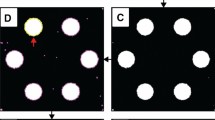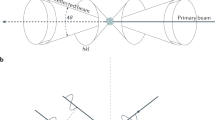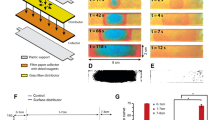Abstract
IN paper chromatography, the RF value, or ratio of distance travelled by substance to the distance travelled by solvent front, is generally used as the criterion of identity. If two substances have the same RF values in two or more solvent systems, they are assumed to be identical. But although RF values are often quoted with great precision, experience shows that they are, at best, only a rough guide and should not be used as the sole means of identifying a substance.
This is a preview of subscription content, access via your institution
Access options
Subscribe to this journal
Receive 51 print issues and online access
$199.00 per year
only $3.90 per issue
Buy this article
- Purchase on Springer Link
- Instant access to full article PDF
Prices may be subject to local taxes which are calculated during checkout
Similar content being viewed by others
References
Smith, J., and Markham, R., Biochem. J., 45, 294 (1949).
Bassham, J. A., and Calvin, M., The Path of Carbon in Photosynthesis, 19 (Academic Press, New York, 1957).
Ponnamperuma, C., Lemmon, R. M., Mariner, R., and Calvin, M., Proc. U.S. Nat. Acad. Sci., 49, 737 (1963).
Author information
Authors and Affiliations
Rights and permissions
About this article
Cite this article
PONNAMPERUMA, C., KIRK, P., MARINER, R. et al. A Coincidence Technique for Paper Chromatography. Nature 202, 393–394 (1964). https://doi.org/10.1038/202393a0
Issue Date:
DOI: https://doi.org/10.1038/202393a0
This article is cited by
-
Transformation of some hydroxy amino acids to other amino acids
Origins of Life (1975)
-
Methyleneaminoacetonitrile: Possible role in chemical evolution-II
Origins of Life (1975)
-
Effect of ionizing radiation and U. V. light on N-acetylglycine in the presence of ammonia
Biophysik (1971)
-
Size Relation between a Chromatographic Spot and its Autoradiogram
Nature (1967)
-
Method of Recording Simultaneously the Positions of Labelled and Unlabelled Compounds on Autoradiographs
Nature (1966)
Comments
By submitting a comment you agree to abide by our Terms and Community Guidelines. If you find something abusive or that does not comply with our terms or guidelines please flag it as inappropriate.



